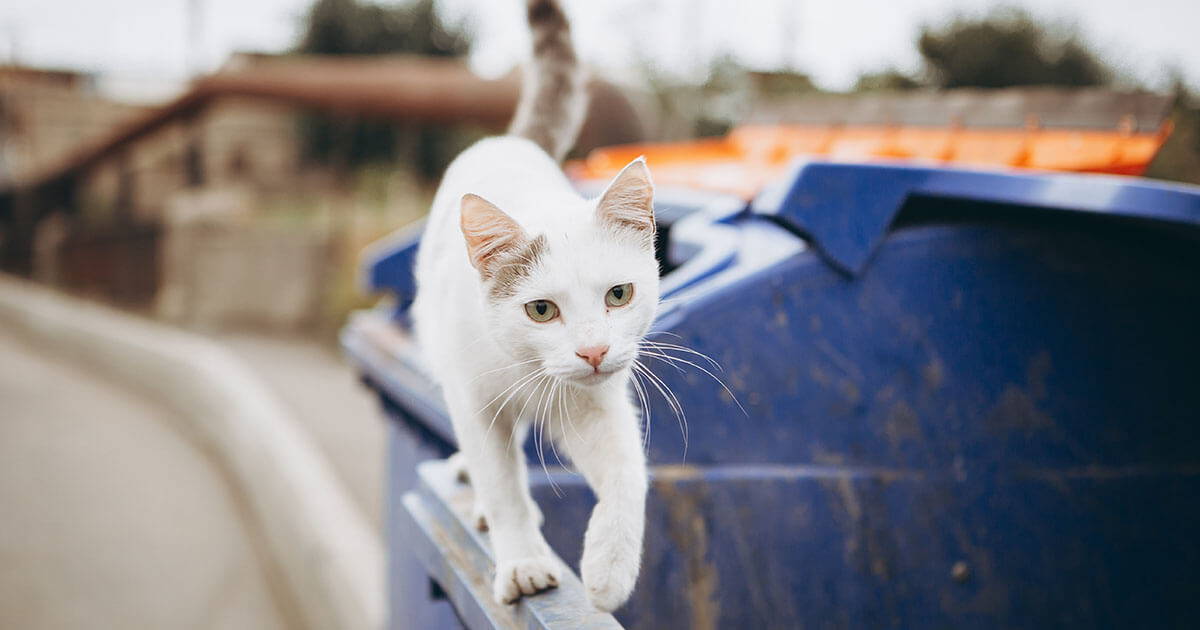A stray cat may not be eating due to stress, illness, or unfamiliar surroundings. Anxiety or medical issues could be suppressing its appetite.
Stray cats often face numerous challenges that can impact their eating habits. These feral felines, when introduced to a new environment or to new people, might become overwhelmed, causing a temporary loss of appetite. Stress is a common factor; being in an unfamiliar territory full of unknown threats can make a stray cat too anxious to eat.
Also, underlying health problems, ranging from dental issues to more serious internal conditions, could be the culprit. With a weakened or sick stray cat, it’s crucial to monitor its behavior closely. Understanding the possible reasons for a stray cat’s lack of appetite is the first step to providing the care and support it may desperately need. Identifying the problem early and consulting with a veterinarian can provide a path to recovery and help ensure the well-being of these vulnerable animals.

Credit: www.pbs.org
Stray Cat Care Basics
Welcome to the world of caring for stray cats, a rewarding experience filled with challenges and joys alike. Understanding why a stray cat might not be eating is crucial for their health and well-being. Before diving into the details, let’s explore some stray cat care basics.
Basic Nutritional Needs
Like all animals, stray cats require a balanced diet to thrive. Their bodies need a combination of:
- Protein – essential for muscle and tissue repair
- Fats – a concentrated energy source
- Carbohydrates – provide energy for their active lifestyles
- Vitamins and minerals – to support overall health
- Water – vital for hydration and kidney function
Proper nutrition is critical. A stray cat may refuse food if it’s not meeting these basic needs or if the food is not fresh and safe to eat.
Importance Of A Safe Environment
A stray cat needs to feel safe to eat comfortably. Stress, noise, and threats can deter a cat from eating. To support them, create:
| Element | Description |
|---|---|
| Quiet Feeding Area | A secluded spot away from noise and disturbance |
| Shelter | Provide a safe space for the cat to retreat after eating |
| Consistency | Maintain regular feeding times to establish trust |
By ensuring these conditions, you offer the cat a stress-free dining experience, which can greatly encourage a healthy appetite.
Signs Of A Disinterested Eater
Is your stray cat turning away from the food bowl? Noticing a change in eating habits can spark worry in any pet caregiver. Understanding the signs that a cat isn’t interested in eating helps in determining the right approach to take.
Behavioral Clues
Cats communicate a lot through their behavior, and changes in eating patterns reveal a lot. Here are some clear behavioral clues:
- Ignored meals: The cat may sniff the food and walk away.
- Distraction: The cat seems more interested in the environment than the food.
- Lack of enthusiasm: The cat shows no excitement at meal times.
- Unfinished food: The cat starts to eat but leaves the meal half-eaten.
Physical Symptoms
Apart from behavior, physical symptoms can indicate a disinterest in food. Look for these:
| Symptom | Description |
|---|---|
| Weight loss | Visible signs of weight drop over days or weeks. |
| Lethargy | The cat sleeps more and shows low energy levels. |
| Poor coat condition | Fur looks dull and is not as smooth. |
| Gastrointestinal issues | Signs of nausea, vomiting, or diarrhea may be observed. |
Common Health Issues In Strays
If a stray cat has stopped eating, it might be due to health issues. Stray cats often face health problems that can affect their appetite. Understanding these issues helps us provide them with the care they need. Let’s explore some common ailments in stray felines.
Dental Problems
Stray cats can suffer from severe dental issues. These problems may cause a lot of pain. Cats with tooth decay or gum disease might stop eating. Look for signs of drooling or bad breath. They need a vet to treat dental problems.
Parasites And Infections
Strays are prone to parasites and infections. Worms, fleas, and ear mites can lead to loss of appetite. They require medications from a vet. Diagnostics and treatments restore their health and hunger.
Stress And Anxiety
Stress can make a cat refuse food. A new environment can cause anxiety. Providing a quiet space can help them feel safe. Cats need time to adjust. Gentle care and patience are essential.

Credit: www.amazon.com
The Impact Of Previous Trauma
Understanding the profound effect of trauma is vital when caring for a once-stray cat who refuses food.
Past experiences often dictate a stray cat’s present behavior, including its eating habits. Trauma can stem from abuse, neglect, or life on the streets, leading to deep-seated fears and a hesitance to accept food.
Trust Issues With Humans
Trust isn’t easy for a cat with a rough past. Cats remember ill-treatment and may associate humans with danger. New environments and different people can be scary. It’s essential to approach these felines with patience and gentleness.
Food Scarcity And Competition
On the streets, cats often fight for every meal. This background of food scarcity leads to anxiety around food. Even in a safe home, they may still feel insecure and guard their food. Other pets can exacerbate this anxiety.
| Tips for Helping a Traumatized Cat Eat |
|---|
| Create a quiet and safe eating space. |
| Keep food and water bowls separate. |
| Introduce new diets gradually. |
| Use soft, calming voices around the cat. |
Addressing Nutritional Deficiencies
Addressing Nutritional Deficiencies in a stray cat can be a delicate task. Felines in the wild or on the streets may experience periods of inadequate nutrition, leading to potential health problems. It’s crucial to understand that a lack of interest in food might stem from a diet lacking in essential nutrients. Carefully choosing the right food and supplements can make all the difference to your stray cat’s well-being.
Switching Food Types
Introducing new food to a stray cat can be challenging, especially if they’re unfamiliar with commercial cat foods. A gradual switch is essential:
- Start with small amounts: Mix new food with familiar flavors.
- Increase over time: Slowly increase the proportion of the new food.
- Offer variety: Wet food can be more enticing than dry kibble.
- Temperature matters: Warm food can enhance aroma and appeal.
Supplements And Vitamins
Supplements can significantly help a cat overcome nutritional deficiencies. Tailor the supplement choice to the cat’s specific needs:
| Vitamin/Supplement | Benefits |
|---|---|
| Vitamin A | Boosts vision and immune health |
| B Vitamins | Supports energy levels and metabolism |
| Calcium | Promotes strong bones and teeth |
| Taurine | Essential for heart and eye health |

Credit: www.pbs.org
Interventions And Encouragement
Seeing a stray cat refuse food can be worrying. Cats may not eat for various reasons, such as stress, sickness, or unfamiliar surroundings. Knowing the right steps can help encourage it to eat. Let’s explore practical ways to help your feline friend.
Creating A Feeding Routine
Consistency is key in encouraging a stray cat to eat. Start by offering food at the same times each day. Cats thrive on routine and will become more confident when they know when to expect their meals.
- Choose a quiet and safe space for feeding
- Remove uneaten food after 30 minutes to keep it fresh
- Try different types of food to see what it prefers
- Keep fresh water available at all times
Offer small portions to avoid overwhelming the cat and gradually increase as it gets more comfortable eating.
Consulting With A Veterinarian
A vet check is crucial if a stray cat is persistently not eating. They can check for health issues that could be causing the lack of appetite. Catching these problems early can save the cat’s life.
| Signs to Watch | Actions to Take |
|---|---|
| Weight loss | Schedule a vet visit |
| Change in behavior | Monitor closely |
| Vomiting or diarrhea | Seek immediate care |
| Refusal to drink water | Provide easy access to clean water |
Remember to transport the cat safely to avoid additional stress. A professional can give the best advice for the stray’s specific situation.
Frequently Asked Questions Of Why Isn’t My Stray Cat Eating
What To Do If A Stray Cat Is Not Eating?
Check the cat for visible health issues and offer a variety of foods to entice eating. Establish a quiet, safe space for the cat to eat without stress. If the cat continues to refuse food, consult a veterinarian for potential health problems promptly.
How Do You Get A Stray Cat To Eat?
To feed a stray cat, offer wet food or kibble in a quiet spot. Consider tasty treats or aromatic food to entice them. Always ensure the food is fresh and water is available. Approach the cat calmly and give them space to eat without stress.
How Long Can Stray Cats Go Without Food?
Stray cats can survive without food for about 1 to 2 weeks, but their health will deteriorate without water within 3 days. Always ensure a humane approach when dealing with stray animals.
Will Stray Cats Leave If You Don’t Feed Them?
Stray cats may leave if not fed as they often seek food sources elsewhere. Yet, some may stay due to shelter or other food sources in the area.
Conclusion
Understanding your stray cat’s eating habits can be challenging. Assure it’s safe and stress-free, and consult a vet if issues persist. The right approach can make a world of difference. Keep showing care and patience; your feline friend will thank you.

